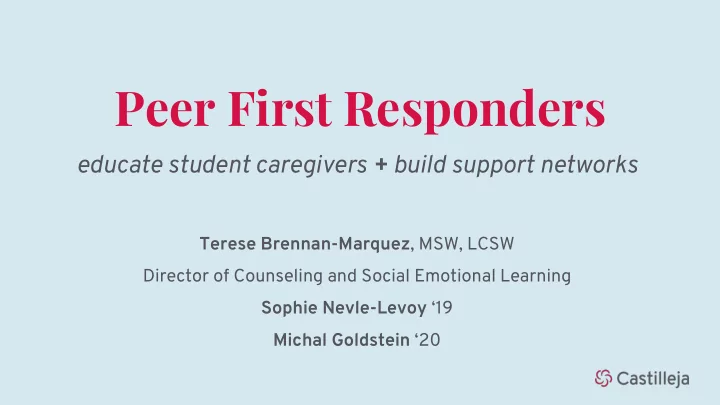

Peer First Responders educate student caregivers + build support networks Terese Brennan-Marquez , MSW, LCSW Director of Counseling and Social Emotional Learning Sophie Nevle-Levoy ‘19 Michal Goldstein ‘20
Opening Centering Listening through the body: ● Track your own breathing. Is it shallow and quick, or measured and relaxed? ● Embody an open posture. Notice what your own body language may be conveying? ● Can you listen through your eyes? Your heart? Your skin?
Why Peer First Responders? Our Challenge Our Solution ● mental health issues ● destigmatize mental health increasing among students ● support students already ● students rely on peers for helping peers support ● provide leadership ● not all students use opportunity, align with counseling department’s goals
How Creating the Program student counseling selection program assessment leadership partnership + training
Now Where We Are Today? Our Team Modes of Contact Outreach Email Upper School Counselor Visits Survey Student Led Emails Posters Website 17 students Physical location 12 trainings/year Bracelets Community time Backpack ribbons
How Training Our Team Skills + Safety Deep Practice Community Assessment Boundaries Listening Sympathy vs. Bridge to Self-Care Cultural Empathy Counselors Context
Video Our Team
Training Active Listening With the person next to you, take 2 minutes to discuss: 1. How would you enter a conversation differently with a peer if you knew from the start that you didn’t need to accomplish, perform, master, or fix something for them? 2. What might feel different in your body and mind if you could just focus on the act of being present?
Training Active Listening
Training Active Listening Active listening is listening for meaning. Active listening means participating in the world of the other person. Active listening means listening with your whole body.
Training Active Listening As a group, share out: 1. What resonated with you from the video? 2. What might you take going forward that will impact the way you listen?
Starting Team Goals Maintain Leaders Counselor Job Confidentiality Who Listen Relationship Description Timing Support Diversity Commitment Others
Starting Application Questions Interview Review Reach out to Read Why PFR? community members applications. who know students. What are your skills? Get a sense of What are your Create students’ concerns? representative personalities. group.
Starting Questions Modes of Establishing Professional Contact Boundaries Oversight Program Safety Meeting Promotion Protocol Logistics
Q + A Download a handout with all of the information: Go to bit.ly/pfrhandout Feel free to contact any of us with questions: Terese Brennan-Marquez tbrennanmarquez@castilleja.org Eva Tuschman - Faculty Lead etuschman@castilleja.org Sophie Nevle Levoy - 2018/19 Lead 19snevlelevoy@castilleja.org Michal Goldstein - 2019/20 Co-Lead 20mgoldstein@castilleja.org
Recommend
More recommend